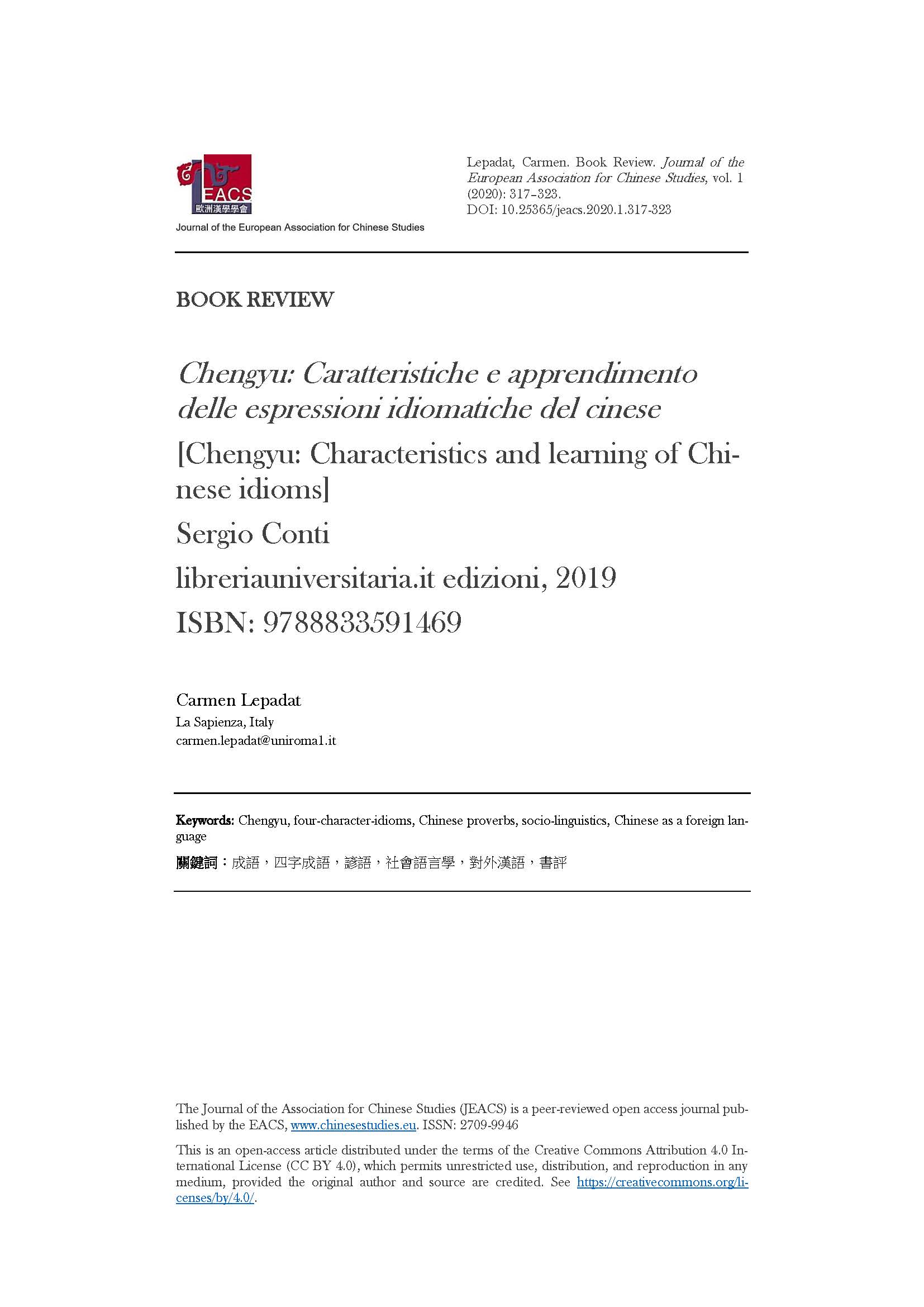Book Review
Chengyu: Caratteristiche e apprendimento delle espressioni idiomatiche del cinese
DOI:
https://doi.org/10.25365/jeacs.2020.1.317-323Keywords:
Chengyu, four-character-idioms, Chinese proverbs, socio-linguistics, Chinese as a foreign language, 成語, 四字成語, 諺語, 社會語言學, 對外漢語, 書評Abstract
Book review: Sergio Conti. Chengyu. Caratteristiche e apprendimento delle espressioni idiomatiche del cinese [Chengyu: Characteristics and learning of Chinese idioms]
Downloads
References
An Liqing 安丽卿. 2016. Chengyu de jiegou he yuyin tezheng 成语的结构和语音特征 (Structural and Phonetic Features of Chengyu). Beijing: Guangming ribao chubanshe.
Boers, Frank. 2001. “Remembering Figurative Idioms by Hypothesising about Their Origin.” Prospect 16 (3): 35–43.
Gibbs, Raymond W. 1994. The Poetics of Mind: Figurative Thought, Language, and Understanding. Cambridge: Cambridge University Press.
Guo, Jiaqi F. 2017. “Learning Chinese Idioms: A Luxury for the CFL Curriculum?” In Teaching and Learning Chinese in Higher Education: Theoretical and Practical Issues, edited by Lu Yang, 83–108. London: Routledge.
Hu Jing 胡静. 2015. “Duiwai hanyu jiaoxue zhong chengyu jiaoxue shijian tanjiu” 对外汉语教 学中成语教学实践探究 (Chengyu Teaching Practice in Teaching Chinese as a Foreign Language). Kaifeng jiaoyu xueyuan xuebao 开封教育学院学报 35 (4): 128–29.
Liu, Dilin. 2008. Idioms: Description, Comprehension, Acquisition, and Pedagogy. New York: Routledge.
Liu Shuxin 刘叔新. 1990. Hanyu miaoxie cihuixue 汉语描写词汇学 (Descriptive Lexicology of Chinese). Beijing: Shangwu yinshuguan.
Shi Lin 石琳. 2008. “Liuxuesheng shiyong hanyu chengyu de pianwu fenxi ji jiaoxue celüe” 留学生使用汉语成语的偏误分析及教学策略 Error Analysis of Foreign Learners’ Chengyu Use and Pedagogical Strategies). Xinan minzu daxue xuebao (Renwen sheke ban) 西南民族大学学报(人文社科版) 6: 280–83.
Sun Weizhang 孙维张. 1989. Hanyu shuyuxue 汉语熟语学 (Chinese Phraseology). Changchun: Jilin Publishing Group.
Wray, Alison. 2000. “Formulaic Sequences in Second Language Teaching: Principles and Practice.” Applied Linguistics 21 (4): 463–89.
Wu Zhankun 武占坤. 2007. Hanyu shuyu tonglun 汉语熟语通论 (A General Survey on Chinese Phraseology). Baoding, China: Hebei daxue chubanshe.
Yao Pengci 姚鹏慈. 1998. “Shi lun hanyu chengyu de changduan” 试论汉语成语的长短 (On the Length of Chengyu). Guangbo dianshi daxue xuebao (Zhexue shehui kexue bao) 广播电视大学学报(哲学社会科学版)1: 67–70.
Zhang Yanping 张艳萍. 2012. “Liuxuesheng Chengyu Nanyi Tidu Yanjiu Fangfa Tanxi’ 留学生成语难易梯度研究方法探析 (Exploratory Research Method for a Chengyu Difficulty Scale for Foreign Learners).” Yunnan shifan daxue xuebao (Duiwai hanyu jiaoxue yu yanjiu ban) 云南范师报年年大 (对外汉语教学与研究版) 10 (5): 22–27.
Zhou Jian 周荐. 1997. “Lun chengyu de jingdianxing” 论成语的经典性 (On the Classicality of Chengyu). Nankai xuebao 南开学报 2: 29–35, 51.
Zhou Jian 周荐. 1998. “Chengyu guifan wenti tanlüe” 成语规范问题谈略 (Discussion on the problem of chengyu standards). Hanyu xuexi 汉语学习 6: 59–62.
Zhou Qing 周青, and Wang Meiling 王美玲. 2008. “Dangqian duiwai hanyu chengyu jiaoxue de biduan he fangfa gexin” 当前对外汉语成语教学的弊端和方法革新 (The Current Drawbacks of Chengyu Teaching in Chinese for Foreigners and Methodological Innovation). Hunan keji xueyuan xuebao 湖南科技学院学报 30 (6): 162–64.
Zyzik, Eve. 2009. “Teaching and Learning Idioms: The Big Picture.” CLEAR News 13 (2): 1, 4–6.

Downloads
Published
Versions
- 2020-12-30 (2)
- 2021-03-07 (1)
How to Cite
Issue
Section
License
Copyright (c) 2021 The Journal of the European Association for Chinese Studies

This work is licensed under a Creative Commons Attribution 4.0 International License.
